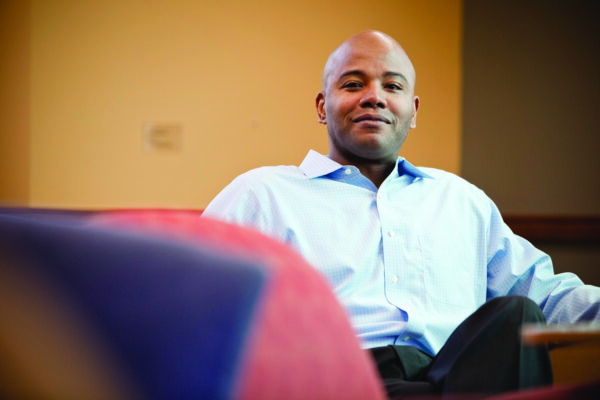Peniel Joseph was in elementary school the first time he joined a picket line, he says, fighting for workers’ rights. He has been involved in social justice efforts ever since. The proud son of Haitian immigrants attributes this to his mother, who raised him in New York City. She was the first feminist, historian, teacher and human rights advocate he knew.
“I’ve been working as a writer, as a scholar, but also as an activist my whole life,” Joseph says.
Joseph, the Barbara Jordan Chair in Ethics and Political Values and the founding director of the Center for the Study of Race and Democracy at The University of Texas at Austin, is the author of several books. His latest, published in April, is “The Sword and the Shield: The Revolutionary Lives of Malcolm X and Martin Luther King Jr.”
Joseph says the idea for the book had been “brewing for a while,” as it is a culmination of his research.
“When you write books, you get introduced to different characters and people and events that attract you,” Joseph says. “I always wanted to situate Malcolm X and Martin Luther King Jr. in a different way.”
Joseph, who says he was “very active in anti-racism and anti-police brutality” as a teenager, studied history and African American studies at Stony Brook University in New York. He went on to earn a doctorate in American history at Temple University in Philadelphia. His expertise, he says, was in African American history, Black feminism, comparative Black nationalism and social movements. He joined UT in 2015.
Many Americans view Malcolm X and King as representatives of contrasting ideals during the civil rights movement — Malcolm X, one of the leaders of the Black Power movement, as the sword, and King, the activist who promoted nonviolence, the shield. But as the title implies, Joseph argues that both men are political revolutionaries; they each “possess the political sword and shield” when they come to converge around the themes of racial inequity.
Joseph says he wrote in the context of the current racial and political climates in America — the Black Lives Matter movement, police brutality, Presidents Barack Obama and Donald Trump, and the white nationalist movement.
“In the age of Black Lives Matter, it’s excruciatingly important because we’re seeing national and global moral and political reckoning around racial justice after the murder of George Floyd,” Joseph says. “Malcolm and Martin are a really big part of the movement in this sense. They set up the context and the structure to talk about Black dignity and citizenship.
“When you think about BLM,” he says, “it combines the Black Power movement’s critique of structural racism with the tactical, nonviolent civil disobedience of the civil rights movement.”
Joseph says he believes we have a generational opportunity right now “to end systemic racism and defeat white supremacy — to achieve what Martin Luther King Jr. called the ‘beloved community.’” This, a community free of racial and economic injustice, or injustice to anyone who is “other-ized,” is possible, Joseph says, “but it’s a matter of doing the work.”
And Joseph says this is “absolutely connected to King and Malcolm because they had those great, grand visions, too.” They were just ahead of their time, he says.
Joseph says the UT community at large has been very supportive of his work: “My colleagues at UT are wonderful. People are very much interested in this space of anti-racism.” And the students have shown Joseph a hunger to talk about “not just diversity, equity and inclusion, but about racial justice and the movement for Black equality in the country,” he says.
“Racial slavery is the original sin and really the foundational principle alongside of notions of freedom, justice, citizenship in the United States,” Joseph says. “And we still have never converged and come to terms with that. I think that’s what’s so powerful about this moment — trying to come to terms with the origins of who we are as Americans.”
In the age of Black Lives Matter, it’s excruciatingly important because we’re seeing national and global moral and political reckoning around racial justice.
OTHER WORKS
Notable publications by staff and faculty members
Pain Studies
By Lisa Olstein
Using her skills as a poet and her lifelong experience with migraines, English professor Olstein examines how we experience, express, treat and mistreat pain.
Haiku History: The American Saga Three Lines at a Time
By H.W. Brands
History professor H.W. Brands has been tweeting the story of United States, a few lines at a time; this book collects some of those short history lessons.
A Boyhood Under Nazi Occupation
By Jan Duijvestein; translated by Janine Barchas
In a very personal project, English professor Barchas translates her father’s recollections about growing up in wartime Holland.
The Reality Game: How the Next Wave of Technology Will Break the Truth
By Samuel Woolley
This book looks at the power of misinformation and how future innovations could help counter the problem. Woolley is a professor in the Department of Journalism and Media.



